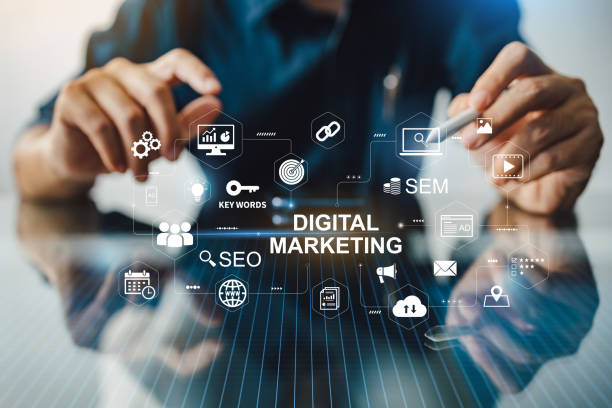 +97333228815
+97339498905
+97333228815
+97339498905
 +966562751002
+966562751002
 +97333228815
+97339498905
+97333228815
+97339498905
 +966562751002
+966562751002

Digital advertising and digital marketing are closely related but distinct concepts within the realm of online business promotion. Here's a breakdown of their definitions and how they differ:
Digital advertising refers to the use of the internet and digital channels to promote goods, services, brands, or businesses. It involves creating and running targeted advertisements through various online platforms to reach a specific audience. Digital advertising aims to generate immediate results and boost sales in the short term by driving traffic, increasing conversions, and raising brand awareness. Examples of digital advertising include paid search ads, display and banner ads, social media ads, video ads, and sponsored content.
On the other hand, digital marketing encompasses a broader set of activities aimed at organizing, promoting, and selling products or services in the market using digital channels and technologies. It involves a strategic approach to attract, engage, and convert potential customers over the long term. Digital marketing encompasses a range of tactics, including digital advertising, content marketing, search engine optimization (SEO), social media marketing, email marketing, influencer marketing, and more. The goal of digital marketing is to build brand awareness, establish a strong online presence, nurture customer relationships, and drive sustained business growth.
While digital advertising primarily focuses on short-term sales results, digital marketing takes a more holistic and long-term approach. It aims to create a comprehensive marketing strategy that combines various tactics to achieve broader business objectives beyond immediate sales, such as brand loyalty, customer retention, and lifetime customer value.
To further expand on the difference between digital advertising and digital marketing, let’s get into the different types of both.
Search Engine Advertising: This type of advertising involves placing paid ads within search engine results pages (SERPs) when users search for specific keywords. The most well-known search engine advertising platform is Google Ads, which utilizes a pay-per-click (PPC) model.
Display Advertising: Display advertising involves placing visual ads, such as banners, images, or interactive media, on websites, mobile apps, or within ad networks. These Ads can appear on specific websites or be targeted based on user demographics, interests, or browsing behavior. The Google Display Network and programmatic advertising platforms are commonly used for display advertising.
Social Media Advertising: Social media platforms like Facebook, Instagram, Twitter, LinkedIn, and TikTok offer various types of advertising options. Businesses can create targeted ads based on user demographics, interests, or behavior and display them within users' social media feeds or as sponsored content. Social media advertising can include image ads, video ads, carousel ads, and more.
Video Advertising: Video advertising involves displaying video ads before, during, or after online video content. YouTube and social media platforms provide options for businesses to run video ads to capture the attention of their target audience.
Native Advertising: Native advertising is designed to blend in with the surrounding content and provide a seamless user experience. These ads are often presented as sponsored articles, recommended content, or promoted listings within websites or platforms.
SEO (Search Engine Optimization): SEO is the practice of optimizing your website to improve its ranking on search engines like Google. By incorporating relevant keywords, creating quality content, and optimizing your website's user experience, you can improve your website's visibility and drive organic traffic to your site.
PPC (Pay-Per-Click) Advertising: PPC advertising allows businesses to place ads on search engines and social media platforms and pay only when a user clicks on their ad. By targeting specific keywords and demographics, businesses can drive targeted traffic to their website and increase their conversion rates.
Social Media Marketing: Social media marketing involves promoting your products or services on social media platforms like Facebook, Instagram, and Twitter. By creating engaging content and targeting your audience based on their interests and behavior patterns, you can increase brand awareness, engagement, and conversions.
Email Marketing: Email marketing involves sending promotional emails to your subscribers to promote your products or services. By segmenting your email list and creating personalized content, you can improve your email open rates and drive conversions.
Content Marketing: Content marketing involves creating and sharing valuable content to attract and engage your target audience. By creating high-quality blog posts, videos, and other types of content, you can increase your website's traffic and establish yourself as a thought leader in your industry.
Video Marketing: Video marketing involves creating and sharing videos to promote your products or services. By creating engaging and informative videos that resonate with your target audience, you can increase brand awareness, engagement, and conversions.
Influencer Marketing: Influencer marketing involves partnering with influencers to promote your products or services to their followers. By identifying influencers who align with your brand's values and messaging, you can reach a wider audience and increase your brand's credibility.
Affiliate Marketing: Affiliate marketing involves partnering with other businesses or individuals to promote your products or services and earning a commission on sales. By partnering with affiliates who have a similar target audience, you can increase your brand's visibility and drive conversions.
In summary, while digital advertising and digital marketing share similarities, they have distinct differences in scope and approach. Digital advertising focuses on immediate sales results through targeted ads on various platforms, while digital marketing aims for a comprehensive strategy to attract, engage, and convert potential customers over the long term. Understanding the differences between the two can help businesses develop a successful online marketing plan that combines various tactics to drive sustained growth.
Whether you're interested in digital advertising or digital marketing, our company can help you achieve your goals. Contact us today to learn more about our services and how we can help your business succeed in the digital world.